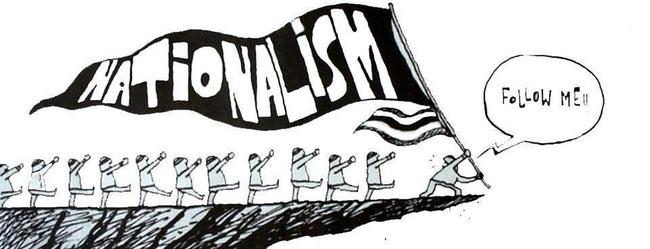Is Nationalism Justified?

For millennia, loyalty has been amongst the most prized traits a human being can have, and for good reason. Early men have lived in tribes, hunted, eaten, and traveled together. Generation after generation would live in the same tribe, so it’s natural that a bond would be formed between the members of the tribe. But as time went on, the human race progressed beyond a nomadic existence; we settled down in villages. But we still lived together in small communities — the premise of loyalty still held. You might know everyone who lived in your village, at least by face. It’s understandable to be attached to it, and the people there.
But we advanced further, and began forming increasingly larger groups. Villages became cities, which began to exert control into the surrounding land, becoming city-states. City-states banded together to form countries. All throughout, human society preserved this notion of being loyal to where you come from. But somewhere along the way, we’ve lost sight of where the idea came from. It’s natural to feel an emotional attachment to those you grow up with — the bond of shared experience and culture is strong indeed. The same could be said of a community in a village, or a neighbourhood, or, hell, even a city. Each city does have its own distinct culture and feel, as evidenced by terms like “The Seattle Freeze”. But scale it up any further, and it starts to get absurd. Modern-day countries have millions of people in them, and yet people continue to have some sort of an emotional attachment to the nation as a whole. Indeed, they seem to be of the idea that we should celebrate the accomplishments of people who happened to be born in India, and not others. At least, not to the same extent.
For example, I often see Indians boasting about or feeling proud of Kalpana Chawla’s achievements, but this never happens with, say, Neil Armstrong. On what basis is this justified? Because she happened to be born within the same political boundary as us? If she was born a little more to the north-west, then she’d be Pakistani, and I doubt people would speak of her with the same pride they do now. Or, they might, depending on whether or not the Muslim League and the Congress had come to an agreement in the 1940s. Either way, it’s pretty arbitrary and only depends on how the politics turned out – how the land boundaries were drawn by politicians long dead. As Dr. House says in House M.D., “Patriotism is loyalty to real estate.“
Another interesting phenomenon is when people take pride in actions of people who are long dead. If Indians can take pride in, say, Aryabhata’s invention of the zero, then by the same token, should modern Englishmen suffer from guilt for their country’s actions a hundred years ago? Everyone who was old enough at the time to have any influence on the decision making process is dead by now. By the same token, should Germans still feel guilty about the atrocities committed by Nazi Germany during World War II?
All this because the people who did those things lived in the roughly the same geographic region as you. It is very common to see people associating Indians with stereotypes like ‘smart folks’, ‘money-minded’, et cetera. I find it hard to distinguish this from racism. Nationalism is the belief that, if someone happens to be born within the same country as you, then they are somehow better than those who aren’t. In this globalized world, why should a fellow human being’s life and actions be more relevant to me just because he happened to be born in the same country as me?
For the most part, educated society looks down on discriminating people based on random factors determined by birth. We don’t feel it’s okay to treat someone differently based on whether they happened to be born as a boy or a girl, or what skin colour they were born with, or indeed, who their parents are. It’s unfortunate that, somehow, where someone is born has become a perfectly acceptable basis for discrimination. It boggles the mind, and I find it hard to provide justification for the same.
I’ll end here with what I started, and leave this article as food for thought for all of you who have read my words so far:
Is nationalism really justified?

 The Mess-y Situation
The Mess-y Situation  Ping! merges with Blogs@IIIT
Ping! merges with Blogs@IIIT  Cricket Corner: Looking Ahead to the Border-Gavaskar Trophy (Pt III)
Cricket Corner: Looking Ahead to the Border-Gavaskar Trophy (Pt III)  A perspective on sports in IIIT
A perspective on sports in IIIT  Paintings of IIIT
Paintings of IIIT  The Tale of Jagruti
The Tale of Jagruti  Cleaning up the Mess?
Cleaning up the Mess?